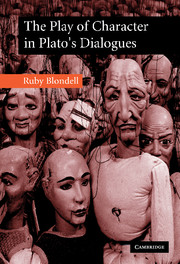Book contents
- Frontmatter
- Contents
- Preface
- 1 Drama and dialogue
- 2 The imitation of character
- 3 The elenctic Sokrates at work: Hippias Minor
- 4 A changing cast of characters: Republic
- 5 Reproducing Sokrates: Theaetetus
- 6 Putting Sokrates in his place: Sophist and Statesman
- Bibliography
- General index
- Index of passages cited
1 - Drama and dialogue
Published online by Cambridge University Press: 22 September 2009
- Frontmatter
- Contents
- Preface
- 1 Drama and dialogue
- 2 The imitation of character
- 3 The elenctic Sokrates at work: Hippias Minor
- 4 A changing cast of characters: Republic
- 5 Reproducing Sokrates: Theaetetus
- 6 Putting Sokrates in his place: Sophist and Statesman
- Bibliography
- General index
- Index of passages cited
Summary
The reader of Plato's dialogues is seduced by a dazzling interplay of unity and multiplicity. This is generated in part by a series of interlocking and overlapping dualities, the chief of which is presented most often – and most reductively – as a tension between “philosophical” content and “literary” form. By articulating these two factors as interdependent we have already created an artificial split that distorts the lived experience of reading Plato. This emerges vividly from the way Cornford omitted certain “dramatic” elements from his translations of Plato, whereas Livingstone printed dialectical passages of Phaedo in smaller type “so that they can be either read or omitted.” Yet the “Western” history of ideas in general, and of Platonic studies in particular, makes some such formulation inescapable. Ironically, Plato himself is in part responsible for this situation, through his focus on the “quarrel between poetry and philosophy” (Rep. 607b). Indeed, it has recently been argued that he was the inventor (rather than an inheritor) of this supposedly “ancient” quarrel. If so, he was also the inventor of his own mutually hostile, or at least mutually suspicious, interpretive communities, which may be crudely divided into “literary” and “philosophical” camps.
Throughout the last century, however, increasing numbers of interpreters have acknowledged that it creates a false dichotomy, and one that undermines the specific power of Plato's writings, either to disregard the “dramatic” elements, or to view “the arguments as subordinate to the drama.”
- Type
- Chapter
- Information
- The Play of Character in Plato's Dialogues , pp. 1 - 52Publisher: Cambridge University PressPrint publication year: 2002



